ASX pares losses as retailers look past retail sales collapse
Shares were down 0.9pc early but fought to a 0.2pc gain – extending a recent streak to four days for the longest rally since February.

- ASX makes comeback after vaccine hit
- Barley just a fraction of iron ore exports
- Charter surge sends Alliance up 25pc
- Apparel sales halve from 2019 levels
That’s all from the Trading Day blog for Wednesday, May 20. The ASX fell 0.9 per cent early clawed back ground to finish at a 0.2pc gain – marking its longest win streak since February.
Early weakness came as world markets pulled back on doubts of a coronavirus vaccine from US biotech Moderna. Overnight, the Dow fell 1.6 per cent, the S&P slid 1.1 per cent and the Nasdaq slipped 0.5 per cent.
Locally, April retail sales collapsed by 18pc as coronavirus restrictions cut off trade, but still, discretionary stocks traded higher.
US futures are trading up 0.6pc, suggesting gains to come tonight.
Robyn Ironside 8.20pm: Qantas buys chunk of Cobham
Qantas has bought a chunk of Cobham Aviation for an undisclosed sum, in a move that will see regional QantasLink services returned to the Flying Kangaroo.
National Jet Systems has operated 20 Boeing 717s on behalf of QantasLink for the past 15-years, using 380 employees.
Although most are currently stood down, Qantas is expected to take on the employees who will remain under existing National Jet Systems’ agreements.
QantasLink CEO John Gissing said Cobham Australia’s strategic review, which commenced mid-last year, provided an opportunity for the two parties to reassess the operating model for the B717s.
“Bringing the operation of our Boeing 717 aircraft into the group provides us with more certainty for the future, which is incredibly important as we come out the other side of the coronavirus,” Mr Gissing said.
“The B717s provide us with flexibility to service many segments of the domestic market, including regional routes, fly in fly out operations or more frequencies to capital cities. These are the kind of routes where travel demand is likely to recover first.”
He said the “back office” changes were unlikely to be noticed by customers.
Nick Evans 8.00pm: Whitehaven Coal expansion approved
Whitehaven Coal has cleared a major hurdle for one of its key growth projects, with the NSW planning department ticking off on Whitehaven’s plans for a $700m expansion of its Vickery coal mine.
The “whole of government” review by the NSW planning department ruled the Vickery expansion was “approvable”, triggering a 12-week process for the state’s independent Planning Commission to make a call on the final fate of the project, which Whitehaven says will deliver another 450 jobs when the mine expansion is fully operational.
Vickery is currently producing about 4.5 million tonnes of coal a year and the expansion, if approved, would take it to 10 million tonnes of annual production of semisoft soft coking coal and high grade thermal coal.
7.45pm: US split on reopening economy
The nation’s top two economic policy leaders offered contrasting visions about the outlook for the US, with Treasury secretary Steven Mnuchin favouring a wait-and-see approach to more federal aid and Federal Reserve chair Jerome Powell suggesting more would be needed.
Their positions reflected differing views on the prospects for a swift economic rebound from the coronavirus pandemic.
Mr Mnuchin, appearing alongside Mr Powell at an online congressional hearing on Tuesday, reflected the Trump administration’s belief that the biggest danger to the economy was waiting too long to restart activity after two months in which millions of Americans have sheltered in their homes to slow the spread of COVID-19 infections.
The Wall Street Journal
James Kirby 6.36pm: Coronavirus spurs rush to cash
The rush to cash by professional and private investors during the depths of the pandemic crisis is only equalled by a similar spike in bank deposits seen during the global financial crisis (GFC), the ratings agency Moody’s said on Wednesday.
New figures from the prudential regulator show a remarkable “spike” in authorised deposits across the financial system in March as financial institutions, superannuation funds and households sought solace in the balance sheet strength of the major banks.
The report follows earlier signals that investors had also moved to hoard cash outside the banking system over the period with reports of safe deposit boxes being booked out across the country.
While the majority of cash hoarding has been related to individuals, Moody’s suggests the bank-based cash deposits lift has been due to a combination of factors led by financial institutions placing cash raised in the money market from trading in treasuries.
Separately, super funds have been preparing for a potential liquidity squeeze as the unprecedented early release superannuation scheme came into action. Up to $20,000 can be taken out of super by individuals pre-retirement over the next two financial years.
The rush into cash by households suggests both a shift to a more conservative approach to money and the wider effect of the national lockdown, which put a lid on many forms of spending, including entertainment and travel.
Wealth Editor James Kirby presents Your Portfolio, a free series of Facebook live Q&A sessions for The Australian each Wednesday evening at 7.30pm.
David Swan 6.09pm: Is your health data safe?
The government’s My Health Record platform was the target of an attempted hack last year, Australia’s national health information officer has revealed.
In a session of the Joint Committee on Public Accounts and Audit on Tuesday, Australian Digital Health Agency (ADHA) CIO Ronan O’Connor said that My Health Record had suffered two potential data breaches since July 2019, requiring it to notify the Office of the Australian Information Commissioner (OAIC).
“The first notification was reported to the OAIC and that was related to a potential compromise to external information technology infrastructures supporting the wider My Health Record system,” Mr O’Connor said.
Gerard Cockburn 5.12pm: ASX grills REX over domestic plans
Regional Express has been grilled by the ASX for providing price sensitive information to the media without disclosing it to the share market.
The domestic airline carrier said it did not expect information it provided to Nine Newspapers last week to have a “material effect” on its share price, saying its previous experience in 15 years of listing was that “nothing much excites the stock market concerning Rex”.
The stock surged by 45.6 per cent last Wednesday, following articles released in the Australian Financial Review and the Sydney Morning Herald concerning a potential push into capital city services to compete with Qantas and Virgin.
Chief executive John Sharp’s comments regarding the airline’s desire to raise $200m in capital for the lease of 10 narrow body jets was also flagged by ASX administrators.
“Given how the share price reacted to the news, it is evident that our judgement call was erroneous,” the company said. “We wish to reassure ASX that Rex will err on the side of caution in the future.”
REX finished Wednesday’s session up 0.9pc to $1.08.
Read more: Rex plots expansion to domestic services with $200m equity injection
5.01pm: Tech outperforms as EML surges
Tech stocks were the best performers of the day, adding 2.2pc by days end.
EML Payments led the charge, up 12.8 per cent to $3.71 on a positive trading update, while Nearmap jumped 9.4 per cent to $1.86, and Altium, added 4 per cent to $36.31.
Afterpay shrugged off the weak retail figures to climb by 2.1 per cent ot $42.89.
Here’s the biggest movers at the close:
4.12pm: ASX makes comeback after vaccine hit
Australian shares took a hit early but managed to hold on to a 0.2 per cent gain at the close to round out a four-day win streak, its longest in more than two months.
The same vaccine that had spurred a rally on the market yesterday was also responsible for its undoing early – as doubts were raised as to the robustness of its early trials.
At the open, the benchmark ASX200 slipped by 0.9 per cent but by midday shares were on the up – closing out the day higher by 14 points or 0.24 per cent to 5573.
Meanwhile, the All Ords put on 21 points or 0.38 per cent to 5680.1.
3.40pm: Afterpay may slip on credit concerns: MS
Any sign of credit concerns or revenue slowdown will likely pressure Afterpay shares, according to Morgan Stanley.
Analyst Andrei Stadnik writes that the broker’s global cross-read shows a net positive for the buy now, pay later platform but headwinds are likely to emerge later in the year.
While US consumers are currently buoyed by the country’s huge CARES Act stimulus, he predicts gross credit losses for Afterpay to rise from around 1pc to 1.2pc in the second half, and to peak at 1.6pc in 1H21. Its net credit losses are forecast to peak at 1.3pc in 1H21 before declining to 1.1pc in 2H21.
He says while US e-commerce trackers show fashion/apparel spend was up by as much as 25pc last month, pricing data shows the segment had its largest monthly price decline in the past five years.
“So while e-commerce growth is accelerating as merchants shift to online in the lockdown, we have little confidence that this can translate into sustained better gross merchant volume growth for APT until it further broadens its retail segment mix,” Mr Stadnik writes.
He says all the good news for the stock is now in the price and keeps it at equal-weight with a price target of $36 apiece.
APT last traded up 2.9pc to $43.20.
3.25pm: Citi sets out bullish US target
Citi’s chief US equity strategist Tobias Levkovich has set a bullish S&P 500 target of 3160 points for June 2021, reflecting expectations for improved economic performance and outlooks for 2H21.
“Embedded in the forecast is an expectation for COVID-19 vaccines and treatments that lift many of the hindrances to “back to normal” practices that still are in place currently,” Mr Levkovich says.
“While some industries could face permanent long-term damage, the Great Pause will reverse itself as time progresses.”
But while his forecast implies a 7.8pc rise from Tuesday’s close at 2922, Mr Levkovich says the US sharemarket is more of a “buy on dips”.
“With less than 7 per cent upside in the next 12 months and Euphoria readings now, we suspect that chasing the market currently is a tad risky but we would be more intrigued with buying at lower levels,” he says.
“Our year-end 2020 view of 2,700 has been surpassed and some pullback is likely.”
He cautions that persistently higher unemployment, tighter lending standards and the upcoming US elections present real challenges for 2H20.
And investors appear to be “too sanguine” under the “Don’t Fight the Fed” mantra.
Gerard Cockburn 3.17pm: Former St George boss returns to Oz
Former St George Bank boss Les Matheson is set to return to Australia after more than ten years working in the UK for the Royal Bank of Scotland and NatWest banking group.
The British financial group announced on Monday that Mr Matheson would leave his role as chief executive of personal banking, which is being taken up by Westpac’s outgoing retail CEO David Lindberg.
The position within NatWest group has been held by a multitude of top Australian banking figures, including former Westpac CEO Brian Hartzer and current National Australia Bank CEO Ross McEwan.
It was noted that Mr Matheson was returning to Australia for family reasons.
NatWest chief executive Alison Rose, said Mr Matheson’s contributions have been vital in digitising the group’s personal banking platforms.
“Under Les’ leadership we’ve made great progress in transforming our personal banking business around the needs and goals of our customers, including helping customers transition from physical to digital,” Ms Rose said.
The Australian understands Mr Matheson has not been approached by Westpac for an executive position.
2.37pm: Barley just a fraction of iron ore exports
While rising tensions with China and 80pc tariffs on Australian barley are concerning, Deutsche says the macro implications of the rift are only minor.
Economist Phil Odonaghoe notes the introduction of 80pc barley tariffs as well as the suspension of some beef exports and reports China may be considering action on other export items such as wine and dairy.
Still, all pale in comparison to Australia’s most lucrative export, iron ore, which makes up 16pc of all exports, with roughly $275m exported per day.
He weighs up the relative importance of the nation’s agriculture exports against that daily iron ore trade – saying total barley exports are worth just three days of iron ore. Dairy comes in at 5 days and beef at a more consequential 40 days.
“Not to dismiss these tensions for those directly exposed, but we judge the macro implications as minor,” Mr Odonaghoe writes.
Read more: The trouble with China has barely begun
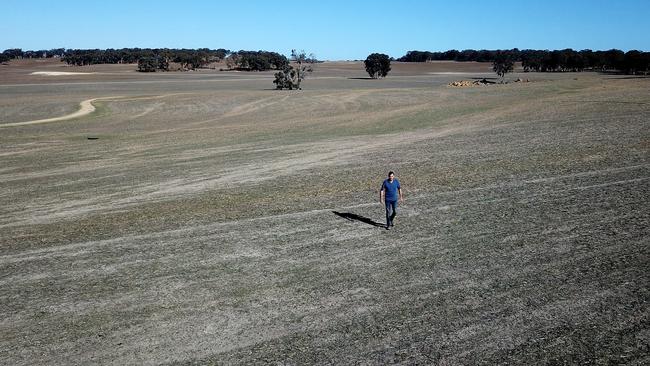
Robyn Ironside 2.21pm: Charter surge sends Alliance up 25pc
Brisbane-based airline Alliance is surging by 23 per cent in afternoon trade as the operator said demand for its charter services was booming during COVID-19.
In a trading update released earlier today, Alliance said it expected annual profit before tax in excess of $40m.
“The additional demand is being driven by a combination of social distancing and a lack of availability of scheduled flights by other operators,” said the update to the ASX.
“Alliance’s operational expertise and flexible approach has seen a significant number of new resource sector clients take up charter services and the expectation is that this level of revenue will continue through the 2021 financial year.”
AQZ last up 23.3pc to $2.65 after hitting $2.80 in early trade.
Read more: Charter flights take off amid COVID-19
2.01pm: Car sales to slump for third year: CS
Aversion to public transport post-COVID-19 is unlikely to provide any meaningful support to local car sales, with weakness to persist for the next two years, according to Credit Suisse.
In a note to clients, the broker writes that while the recovery in vehicle sales in China has been swift and early signs are positive in the US, our own local market will have a harder time.
“For Australia, assuming 2020 will mark the third year in a row of declines, we expect a recovery in 2021 and 2022, although suspect it will take around two years to potentially return above 2019 levels,” the broker said.
Though pent-up demand and vehicle affordability are expected to support the sector, higher unemployment, lack of house price support and questions over lending pose risks.
In addition, though there is some speculation of aversion to public transport given inherent virus risk, the broker adds that it is unlikely to be “a meaningful driver to materially offset other factors”.
Nick Evans 1.55pm: Alumina warns COVID could hit payout
Alumina chairman Peter Day says the company’s board will need to “closely review” whether it can maintain dividend levels this financial year given the impact of the coronavirus on the global aluminium levels.
Mr Day told shareholders dialling in to the company’s annual shareholder meeting Alumina, which holds 40 per cent of the Alcoa Worldwide Alumina and Chemicals, faced increased capital calls for its global business and an uncertain impact on demand for its products and needed to take a cautious approach to manage its debt levels.
Alumina paid a US8c final dividend at its full year financial results, and Mr Day said the company had maintained a “solid” 5 per cent dividend yield to shareholders. But he said the capital requirements for its business had increased in 2020.
“We cannot forget AWAC is a capital-intensive business. Its sustaining capital requirements have increased in 2020,” he said.
AWC shares last down 2.6pc to $1.44.
Read more: Alumina keeps dividend ‘under review’
1.48pm: June key for REIT distributions: MS
Morgan Stanley’s Simon Chan points out that June 2020 “could be a very interesting, and potentially uncertain, distribution notification season”, for Australian listed real estate stocks.
“This is because 10 of the 14 stocks we cover have no distribution guidance, or guidance has been withdrawn on the back of COVID-19 uncertainties,” Mr Chan says.
He notes that the only A-REITS with confirmed distribution guidance are Goodman, Charter Hall Group, National Storage REIT, and Waypoint REIT, while Lendlease doesn’t normally provide distribution guidance in any case.
“June 2020 is an unprecedented June, as we will get first-time disclosure of June-half DPS (after guidance was withdrawn recently),” he says.
“But with COVID-19 rent talks still unresolved, REITs have to choose between a rough estimate, delaying Record Dates, or cancelling DPS – all options have consequences.”
The REIT sector last traded down 0.5pc.
1.40pm: Foot traffic encouraging for retailers: ARA
Early reports of foot traffic and sales for May are positive, with reason to feel “cautiously optimistic”, according to the peak body for Australian retailers.
Commenting on April’s retail sales collapse of 17.8pc, Australian Retailers Association chief Paul Zahra says the statistics are “painful to see” but no surprise.
He cautions against reading too much into sales figures for March to May given the unprecedented conditions.
“We are encouraged by the obvious enthusiasm from Australians to return to physical stores – as reflected in the crowds of shoppers in stores around the country over recent weekend trading,” he said.
“However, our retail recovery will be slow and will track alongside our economic recovery which remains in uncharted territory globally for the short term at least.”
Read more: Lockdown a wipe-out for old retail

1.01pm: Shares pare losses
The local market has fought back to flat trade at lunch, as the major banks pare earlier losses and tech stocks continue to outperform.
At lunch, the benchmark ASX200 was trading flat at 5559.9 – just a fraction of a point higher than last night’s close of 5559.5.
Keep in mind that the market had been down as much as 0.9 per cent early, though the moves are likely helped by a pick up in US futures – last up 0.5 per cent.
EML Payments is outperforming, up 14pc while the major banks are down just 0.1pc to 0.4pc from earlier falls as much as 2pc.
Here’s the biggest movers at lunch:
Eli Greenblat 12.47pm: Myer continuing to open store network
Department store owner Myer is continuing to slowly open its network of stores after closing them last month due to the coronavirus pandemic.
Myer will open another nine stores from Friday, including its Canberra City store and stores in Carousel and Joondalup in WA.
This is in addition to 15 trial stores that have already opened across NSW, Queensland, WA and SA.
However in the stores to be opened, or already opened, a number of services will not be offered, namely beauty appointments and fittings for intimate apparel, suits or shoes.
MYR last up 1.9pc to 26.5c.
12.35pm: Apparel sales halve from 2019 levels
Following a surge in retail sales due to panic buying, April’s sales are now 9.4 per cent below the level of a year ago and at levels last seen in late 2015.
NAB markets economist Kaixin Owyong points out that sales fell in every industry, but were particularly large in eating out, apparel and department store categories.
Apparel sales alone fell to around half the level a year ago.
The bank forecasts GDP to fall by around 8pc in the second quarter, as consumer spending drags.
The b
ABS released an early look at April retail trade and this amusing chart from @NAB shows the historic 8.5% surge in retail spending in March (hoarding) followed by an even bigger 17.9% fall in April (hoarding payback and forced closure of shops, cafes, restaurants, etc).#ausbiz pic.twitter.com/Ve7v1rW6hB
— Patrick Commins (@ComminsP) May 20, 2020
Bridget Carter 12.15pm: Abacus tilt for National Storage not certain
DataRoom | Investors in Abacus Property Group should “not hold their breath” for a takeover of National Storage REIT by the company, say analysts at Credit Suisse.
“We do not think its investment in National Storage REIT is a precursor to a takeover bid,” the analysts said in a research note.
Abacus took up shares in its Australian listed rival after business came close to being sold to Public Storage out of the United States for $1.9bn.
The bid was before the COVID-19 restrictions came into force and later abandoned.
Abacus took a stake of about 4.9 per cent in the business.
But its stake was recently diluted down following a National Storage REIT placement from which it was excluded from participating.
Read more: Abacus lifts stake in National Storage REIT
11.47am: Markets look past retail plunge
Australian financial markets are looking past a plunge in preliminary retail sales for April as the economy continues to reopen after lockdowns.
Preliminary retail sales fell 17.9pc as the food retailing industry fell 17.1pc. That followed an 8.5pc lift in March due to stockpiling of food and household goods ahead of coronavirus restrictions.
“While March saw a mix of impacts related to COVID-19 across industries, these impacts were overwhelmingly negative in April, as regulations regarding social distancing measures limited the ability of businesses to trade as normal for the entire month,” the ABS said.
The S&P/ASX 200 index is down 0.3pc at 5542, having pared most of a 0.9pc fall as S&P 500 futures have risen 0.5pc.
AUD/USD has risen 0.3pc to 0.6557.
Australian retail sales fell 17.9% in April - the largest monthly fall on record - following last month's increase of 8.5% #ausbiz pic.twitter.com/hEwhqtluE6
— Callam Pickering (@CallamPickering) May 20, 2020
11.37am: Westpac leading index weakest since GFC
Westpac chief economist Bill Evans has described the pace of the Australian economic collapse as “unprecedented”, as the bank’s leading index sinks to the weakest level since the GFC.
The index, which indicates the likely pace of economic activity relative to trend three to nine months into the future, fell from -2.34 per cent in March to -5.16 per cent in April.
Previous lows in the growth rate were -4.61pc in March 1961, -5.59pc in February 2009 but all dwarfed by -7.5pc in August 1974.
To put the move in context, over the past six months the growth rate has fallen from 0.53pc in November to its current read of -5.16pc.
“The Leading Index growth rate is likely to recover as coronavirus restrictions are removed. However ongoing public health concerns are likely to see restrictions continue to disrupt economic activity for many months to come,” Mr Evans said.
“We do not expect the economy to return to pre-coronavirus levels of activity before 2022.”
11.25pm: EML chair sell as quarterly results impress
EML Payments chairman Peter Martin will sell down as much as 5 per cent of his stake in the payments technology group, set to cash in as the stock lifts on its strong first half results.
The group told the market today the 70-year-old Mr Martin intended to sell between 300,000 and 400,000 shares before May 31 “given his stage of life, family and other needs” but expected to remain a substantial shareholder for year to come.
Mr Martin currently holds 7.72 million shares in the group and, if sold at current levels, the sale could net the chairman as much as $1.5m.
The news comes as EML shares surge by 13.1 per cent to $3.72pc on its third quarter update – the company reporting earnings growth of 24pc over the past nine months to $27m and revenue up 20pc to $87.1m.
Perry Williams 11.10am: Boral to defend US windows lawsuit
Boral will vigorously defend a $US450m ($686m) lawsuit filed by the former boss of a US windows business it acquired and said the “exorbitant damages” claim was designed to distract from his own conduct and Boral’s own legal claim against him.
The Australian on Wednesday revealed Billy Robinson, the majority owner of the Krestmark windows business, launched the massive counterclaim against Boral after the Australian building materials giant had filed its own lawsuit alleging the Texas businessman had breached a non-compete clause once the deal had settled.
Boral confirmed it had been in litigation with Mr Robinson since October 2018 but said the counterclaims made by the Texan businessman held no merit.
“We believe he has asserted an exorbitant damages claim in order to gain headlines and distract from his own conduct and Boral’s claims,” a Boral statement to the ASX said.
“The company vigorously defends Robinson’s allegations and is actively defending the Robinson claims and pursuing its claims in court.”
Read more: Boral faces $700m US suit
10.55am: RBNZ hoses down negative rate talk
RBNZ Governor Adrian Orr has poured cold water on speculation that NZ will adopt negative interest rates any time soon, telling Bloomberg TV that while he’s open to negative rates at some point, it would be a last resort.
“We don’t want to go negative at this point; we’re prepared to if we have to but not until a lot later,” he said. “It’s got to jump the hurdles. It’s got to be seen to be necessary. It’s got to be seen to be effective, efficient and operationally capable.”
His comments have sparked a 0.4pc rise in NZD/USD to 0.6100 – making it the best performing G10 currency so far today.
After hitting a 6-month high of 1.0844 on Monday, AUD/NZD has fallen 0.2pc to a 5-day low of 1.0760.
The RBNZ said last week it will keep its official cash rate at 0.25pc through the first-quarter of 2021.
“Why remove options from your table if they can be of use?” Mr Orr told Bloomberg.
“It comes down a lot to thinking about what is the limit to a negative interest rate and what it does and doesn’t do to retail banks’ balance sheets. So that’s the work we’re doing and I would never say never, we need to keep the options on the table.”
He also cautioned that despite good demand for NZ exports, its tourism and education sectors relied heavily on foreign visitors.
Read more: RBNZ ‘planning’ for negative rate scenario
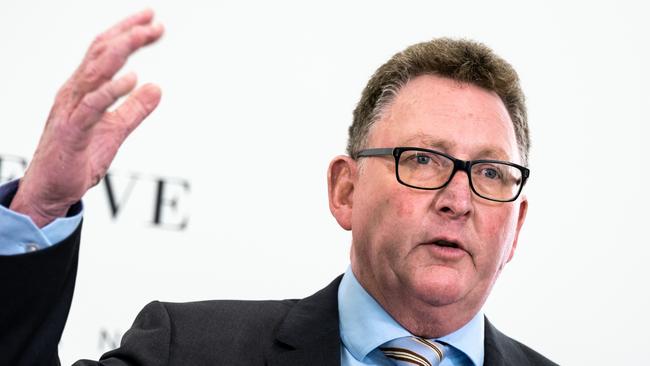
Bridget Carter 10.52am: JP Morgan in alliance with Craigs
DataRoom | Investment bank JP Morgan and New Zealand firm Craigs Investment Partners have formed a strategic alliance, the firms announced on Wednesday.
It comes after DataRoom flagged the alliance in February.
JP Morgan’s Australia and New Zealand chief executive Robert Bedwell said the alliance elevated its offering for New Zealand-based clients.
As part of the arrangement, Craigs would remain as a stand-alone business, with Craigs’ staff shareholders retaining fulling ownership.
Last year, Craigs announced that it had bought out Deutsche Bank from its 49.9 per cent equity interest in the business after the German lender announced a retreat from equities globally.
The Craigs venture in New Zealand offers a full range of corporate finance and capital markets advisory services.
Read more: JP Morgan mulls tie up with Craigs
Adeshola Ore 10.40am: Joyce defends Qantas distancing stance
Qantas CEO Alan Joyce has defended the airline’s decision to not enforce social distancing on its flights.
Mr Joyce said passengers who displayed COVID-19 symptoms would not be allowed to fly.
“If you are not feeling well when you wake up for your flight there will be no cost of changing your ticket and we will be asking people to do that,” he told the ABC on Wednesday.
“We know hundreds of thousands of people have travelled on aircraft throughout COVID-19 and there’s no person-to-person transmission on an aircraft.”
QANTAS’s post-pandemic operation plan does not include blocking out the middle seat to practice social distancing. Mr Joyce said this practice would cause airfare prices to rise.
“The idea of the middle seat isn’t social distancing. It’s a 60m difference between two people. To get the full metre squared, you would end up with 22 people on an aircraft of 180 seats and the airfares nine to ten times as much.”
Follow the latest at our coronavirus live blog
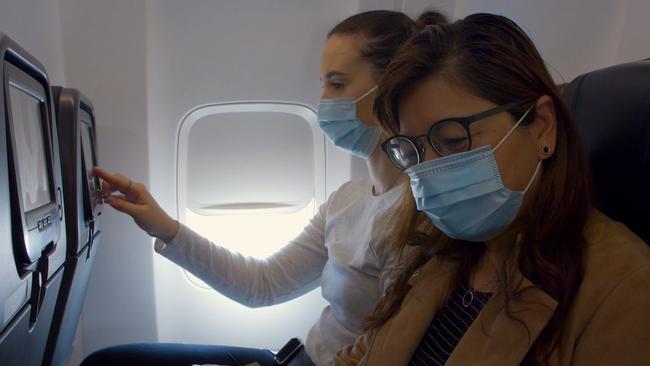
10.14am: Shares pullback as optimism fades
Shares are pulling back by 0.9 per cent early, to track a slip on Wall Street after vaccine hopes faded overnight.
At the open, shares are up by 51 points or 0.92 per cent to 5508.5.
US stock index futures are up 0.2pc to 0.3pc this morning, which may lend support, albeit it’s hard to find any positive news stories to support an immediate rebound in the US sharemarket.
Domestically, most of Tuesday’s outperforming sectors – including Real Estate, Energy, Materials, Consumer Discretionary – are underperforming today, along with Financials and Utilities.
BHP is lower by 1.6pc as Rio trades off by 1pc and the major banks all wind back between 0.9pc and 1.3pc.
The surprise in terms of outperforming sectors today is Technology.
EML Payments leads with a 9pc rise, while Altium is up 2.2pc and Xero is up 0.5pc.
Eli Greenblat 10.01am: Hirschowitz resigns from Kogan.com board
Michael Hirschowitz has resigned as a director of online retailer Kogan.com after joining the board a little over a year ago, with the company citing “increasing commitments in his other business interests” for his surprise departure.
Mr Hirschowitz joined the board in March 2019, and his exit comes just a week after the Kogan.com’s remuneration committee – of which Mr Hirschowitz is a member – put up a lucrative bonus scheme for Kogan.com founder Ruslan Kogan and CFO David Shafer worth as much as $53m.
In a statement to the ASX Wednesday morning Mr Hirschowitz said his commitments had grown in his 15 months in the role: “it is neither in the company’s nor my best interests for me to continue in the role if I am unable to fully participate”.
Mr Hirschowitz is also the chief financial officer at fast food chain, Guzman y Gomez, and will step down from his board duties from May 20.
Meanwhile the juicy options package for Mr Kogan and Mr Shafer needs to be supported by shareholders and could deliver 3.6 million options to Mr Kogan and 2.4 million options to Mr Shafer. On the current Kogan share price, Mr Kogan’s options are worth roughly $31m and Mr Shafer’s options $21m.
Read more: Plan to award Kogan.com bosses $50m in options
Jared Lynch 9.52am: AACo unfazed by China beef ban
Australia’s biggest beef producer, Australian Agricultural Company, says it can divert meat destined for China to other parts of the world after the Asian powerhouse’s decision to ban exports from four Queensland abattoirs.
Company managing director and chief executive Hugh Killen said China accounted for about 15 per cent of AACo’s total meat sales and so far the China suspension has hit under two-thirds of those sales.
But he said the company was able to mitigate the fallout thanks to its global footprint and was working closely with the government and industry stakeholders to assess the fallout.
“China sales represented approximately 15 per cent of total meat sales for AACo in FY20. At this point more than one-third of AACo’s exports to China are not impacted by the suspension,” Mr Killen said.
“AACo’s global footprint and customer base also enables us to divert product to other markets if required, reducing the overall impact on our operations from the suspension of some facilities licensed for China.”
It comes as AACo posted a $31.3m net profit in the 12 months to March 31 versus a $180m loss the previous year, which included a $45.6m Gulf flood livestock write off.
Nick Evans 9.41am: Rainfall eases Newcrest water threat
Newcrest Mining says any drought threat to its flagship Cadia gold mine in NSW has been alleviated, with the company saying on Wednesday it is confident it has supplies to last it through at least two years of production.
Despite recycling about 85 per cent of the water it uses, Cadia was still at risk of production halts if the savage drought continued, with Newcrest previously saying that if rainfall had remained at 1-in100 year lows, as it had for the previous two years, production at the mine could be under threat in early 2021.
But Newcrest said today solid rains in the region, and the purchase of new water licenses, had alleviated the threat.
“Recent rainfall in the region and the purchase of water licences on the water trading market has resulted in improved levels of water being captured in on site storage facilities. Newcrest’s latest internal modelling indicates that Cadia should have enough water to avoid any water-related production interruption for at least the next two years,” the company said.
“Newcrest will continue to pursue further water saving and optimisation initiatives.”
Newcrest shares last traded at $32.
9.39am: Genworth loses NAB contract
Genworth Mortgage Insurance signalled the loss of a major contract after National Australia Bank sent notice that it won’t renew its supply and service deal.
The lenders mortgage insurance company said Wednesday that the contract with NAB was worth 12pc of gross written premiums in the 2019 fiscal year. It will expire November 20, Genworth Australia said.
“We are disappointed in the outcome given our longstanding relationship with NAB and would have welcomed the opportunity to continue the partnership,” said Genworth chief executive Pauline Blight-Johnston. “We believe we presented a strong offer that reflected the risk of the portfolio while maintaining adequate returns on equity for our shareholders.”
According to Genworth Australia, NAB still has the option to extend the supply and service contract for up to four periods of three months each.
Genworth Australia recently renewed a contract with its largest customer, Commonwealth Bank of Australia, for three more years. The new contract is effective January 2020.
Dow Jones Newswires
9.33am: Charts suggest stocks to test support
Sharemarkets are set to test support again after doubts arose about the efficacy of Moderna’s vaccine.
For the S&P 500, that means the 2800 points level may be retested after recent highs and 100 and 200-day moving averages in the 2950-3000 area proved tough.
For the S&P/ASX 200, Tuesday’s “false break” above recent tops in the high 5600 may see a relatively sharp dip toward support around 5300 points.
BHP ADR’s equivalent close at $34.31 indicates that BHP shares could open down about 2pc.
Tuesday’s outperformers – Real Estate, Energy, Materials, Consumer Discretionary and Industrials – may lead a short-term pullback but the S&P/ASX 200 is now in an “ascending triangle” pattern with rising support, currently at 5285, and horizontal resistance in the 5550-5600 area.
Moreover, the local index overall looks bullish after a “rising wedge” pattern in March-April failed to generate the expected resumption of the preceding downtrend.
Since then it has moved sideways, albeit with rising support, consistent with unprecedented fiscal and monetary policy stimulus, the success of coronavirus lockdowns and accelerated efforts to restart the domestic and global economy.
ABS preliminary retail sales and skilled vacancies data for April are due at 1130 AEST.
Gerard Cockburn 9.19am: Sydney Airport arrivals plummet
Sydney Airport passenger traffic almost came to a halt for the month of April as ongoing coronavirus restrictions continue to keep the aviation industry grounded.
The country’s largest airport recorded a total passenger count of 92,000, a 97.5 per cent decline compared to April 2019.
Sydney Airport said it expects the passenger collapse to continue until government travel restrictions ease.
Just 43,000 passengers were from international flights, while 49,000 domestic travellers passed through the airport.
It noted international travel was down 96.9 per cent from the year before while domestic traffic had been wiped out by 97.9 per cent.
Excluding Australian nationals, UK and Chinese passenger numbers declined by more than 90 per cent. Both usually make up the largest proportion of overseas travellers to pass through the airport.
Qantas and Virgin Australia are still operating key overseas routes, as part of government-subsidised international repatriation flights.
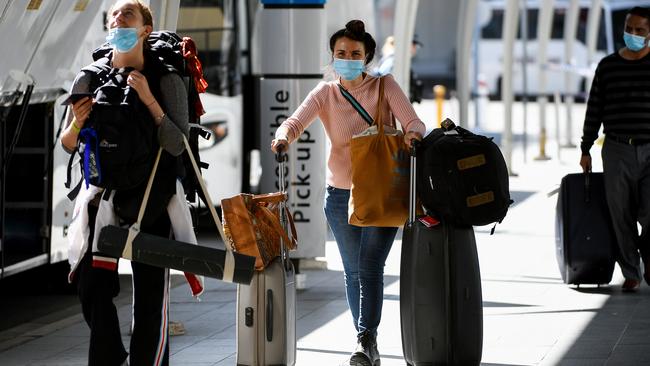
9.00am: Boral welcomes ‘favourable’ court judgment
Boral has welcomed a Queensland court judgment against its cement supplier Wagners, bringing to a close a 12 month pricing dispute between the two parties.
Full details of the outcome remain under wraps until June 4 under a confidentiality order by the court, but Boral this morning simply told the market it had welcomed the “favourable ”.
“Boral welcomes the judgment by the Queensland Supreme Court and we are pleased with the long term impacts of this result under our cement supply agreement with Wagners,” chief Wayne Manners said.
“The result fulfils our objective to exercise our contractual rights to ensure that we can source cement at competitive rates.”
In March last year, Wagners suspended deliveries to Boral saying the customer had been trying to force down its contract prices because it had been offered cheaper prices by an unnamed competitor.
Wagners shares were halted yesterday for the verdict, to return to trade tomorrow.
Read more: Verdict confidential in Boral, Wagners feud
8.50am: What’s on the broker radar?
- ALS raised to Neutral – Goldmans
- ALS raised to Outperform – Credit Suisse
- AP Eagers cut to Neutral – Credit Suisse
- Abacus Property raised to Outperform – Credit Suisse
- Appen cut to Neutral – Credit Suisse
- Baby Bunting raised to Buy, price target lifted 26pc to $3.35 – Citi
- Evolution cut to Equal-weight – Morgan Stanley
- Evolution cut to Hold – Canaccord
- Fletcher Building price target cut 17pc to $NZ4.03 – Macquarie
- Geopacific rated new Buy – Shaw and Partners
- Kogan.com target price raised 35pc to $8.50 – UBS
- Silver Lake Resources cut to Hold – Canaccord
8.26am: 500 Aussie jobs to go at Fletcher
New Zealand-headquartered and ASX-listed construction play Fletcher Building says it will cut as many as 500 people from its Australian business. The cuts come on top of 1000 roles being axed in New Zealand.
“While we looked at all parts of our business to remove costs, regrettably we believe we will not be able to support the same number of people. We have to make some very difficult decisions which include looking at reducing the number of people we employ by approximately 10 per cent,” says Fletcher Building chief executive Ross Taylor.
In Australia Fletcher building generates the majority of its revenue from residential construction, while it also is involved in commercial building construction. The building company warns the outlook in Australia remains uncertain with “potential for further downside”.
Fletcher Building says with no revenue across most of its New Zealand operations during the Level 4 lockdown and Australia revenues running at around 90 per cent of pre-COVID-19 expectations, the Group recorded an operating EBIT loss for April of $NZ55m ($51.1m).
8.01am: Oil prices mixed
US crude ended slightly higher overnight, as US Treasury Secretary Steven Mnuchin said he supported extending certain measures intended to bolster the economy, while Brent ended lower on concerns that output cuts might not be sufficient.
Oil has rallied for several days following numerous output cuts from major producers to curb supplies, and as demand picks up with governments worldwide easing restrictions on movement put in place to stop the spread of the coronavirus pandemic.
The front-month contract for US West Texas Intermediate crude, which expires on Tuesday, settled up 68 US cents a barrel, or 2.1 per cent, at $US32.50 a barrel. The July contract, trading at vastly higher volumes, settled up $US31.96 a barrel.
Benchmark Brent crude was settled at $US34.65 a barrel, down 16 US cents or 0.5 per cent.
Reuters
7.30am: ASX set to slump at the open
The ASX is set to reverse some of the big gains made on Tuesday after US doubts about a possible coronavirus vaccine.
At 7am (AEST) the SPI 200 futures contract was lower by 83 points, 1.49 per cent, to 5,491.0, indicating a loss in early trade.
The contract’s low numbers come after US investors overnight focused on a report questioning biotech Moderna’s coronavirus vaccine early stage trial results. The US company’s early results prompted rampant buying on markets the day earlier.
However the report questioned the validity of the results, and Moderna’s share price finished trading lower by more than 10.0 per cent.
That concern also contributed to a widespread slide in trading which left the Dow Jones Industrial Average down 390.51 points, or 1.59 per cent, to 24,206.86, the S&P 500 lost 30.97 points, or 1.05 per cent, to 2,922.94 and the Nasdaq Composite dropped 49.72 points, or 0.54 per cent, to 9,185.10.
The Australian dollar was buying US65.37 cents, down from US65.46 cents at the close of trade on Tuesday.
AAP
7.00am: Fletcher Building to cut workforce
Fletcher Building said it plans to reduce its workforce in New Zealand and Australia by 1500 people as the pandemic induces a sharp economic downturn in the coming year and beyond.
The job cuts are equal to about 10 per cent of the construction company’s workforce, it said.
The majority of the reductions – about 1000 jobs – will be in New Zealand.
Fletcher Building said lockdowns to control the spread of the coronavirus resulted in it recording an operating loss of about $NZ55 million in April. Core businesses are expected to be profitable in May and June, the company said.
It expects residential building consents to fall about 30 per cent in New Zealand in the year to June 2021 and the value of commercial construction work to decrease about 15 per cent. Infrastructure work put in place would drop by 10 per cent.
For Australia, the company expects residential building consents to drop 15 per cent and commercial and infrastructure works to fall by similar percentages to New Zealand.
Dow Jones Newswires
6.10am: US stocks end lower after rally
The Dow Jones Industrial Average slipped, following the biggest rally in blue-chip shares in more than a month.
The Dow retreated 1.6 per cent giving up some of its gains a day after a 3.9 per cent jump sparked by signs of progress toward a coronavirus vaccine. Meanwhile, the S&P 500 slid 1.1 per cent, while the tech-heavy Nasdaq Composite was fell 0.5 per cent.
“Investors are just pausing for a breather after yesterday’s excitement about the potential development of a vaccine,” said Hugh Gimber, strategist at JP Morgan Asset Management.
A successful vaccine would clear the way for a faster recovery in economic growth, he said, but “clearly there’s a long way to go before that would come into practice.”
After surging 1.8 per cent yesterday on the hopes for a virus vaccine, the ASX is set to open lower. At 6.00am (AEST) the SPI futures index was down 84 points, or 1.5 per cent.
Despite yesterday’s rally, the US stock market has hovered in a relatively tight trading range for the past three weeks, with the S&P 500 largely staying between 2800 and 3000.
That calm stretch stands in contrast to the market’s swift collapse from late February to mid-March, or the sharp rebound that followed, as investors digested the impact of the COVID-19 pandemic and sweeping lockdown measures that brought much of the US economy to a halt.
For markets to break out of that range, investors would need clear evidence that steps to reopen the US economy are working, said Michael Stritch, chief investment officer of BMO Wealth Management.
In the meantime, the safest bets are big companies that can operate best during the pandemic, he added, citing large retailers like Walmart, which on Tuesday reported strong online sales in the first quarter. Shares of Walmart closed down 2.2 per cent.
Overseas, the pan-continental Stoxx Europe 600 dropped 0.6 per cent. European officials have warned in recent weeks that more action is needed to boost the eurozone’s recovery. Late Monday, Germany and France proposed establishing a EUR500 billion ($US546 billion) recovery fund to support regions worst hit by the pandemic.
Oil prices slipped, with futures on Brent, the global crude benchmark, declining 0.5 per cent to $34.65 a barrel, a reversal after three consecutive days of gains.
Most major Asian benchmark indexes closed higher on the promising vaccine news. Japan’s Nikkei 225 climbed 1.5 per cent and South Korea’s Kospi Composite added 2.3 per cent.
Dow Jones
6.00am: VW bosses avoid trial
Volkswagen chief executive Herbert Diess and supervisory board chief Hans Dieter Poetsch have avoided trial over “market manipulation” allegations with an out-of-court settlement of nine million euros, the German car giant said.
“According to the assessment of the supervisory board, it is in the best interest of the company for the proceedings to be terminated,” VW said, adding that it therefore agreed to pay 4.5 million euros to settle the charges against each of the top executives.
AFP
5.50am: Mnuchin and Powell differ on economy
Facing the gravest US economic crisis in decades, Treasury Secretary Steven Mnuchin and Federal Reserve Chair Jerome Powell offered Congress contrasting views of what the government’s most urgent priority should be.
Striking a theme frequently pushed by President Donald Trump, Mnuchin warned that prolonged business shutdowns would pose long-term threats to the economy, from widespread bankruptcies for small businesses to long-term unemployment for millions of Americans.
“There is risk of permanent damage,” Mnuchin said.
Powell, by contrast, stressed, as he has in recent weeks, that the nation is gripped by an economic shock “without modern precedent” and that Congress must consider providing further financial aid soon to support states, localities, businesses and individuals to prevent an even deeper recession. “What Congress has done to date has been remarkably timely and forceful,” Powell said. “But we need to step back and ask, ‘Is it enough?”
Their points of emphasis reflect the contours of a debate occurring across the country, among individuals, business people and political leaders, about when and under what circumstances the economy should reopen and what further help the government can or should provide.
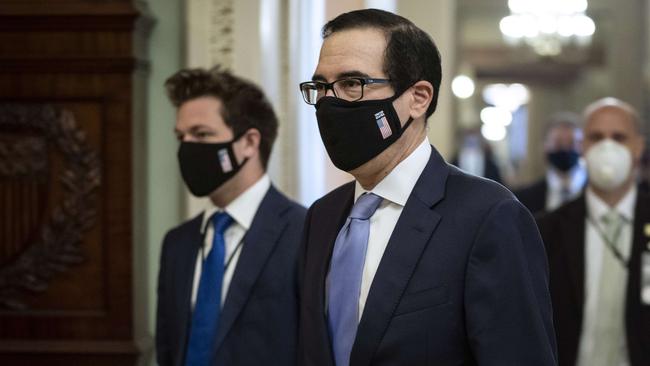
AP
5.42am: Google abandons AI tools for drillers
Google says it will no longer build custom artificial intelligence tools for speeding up oil and gas extraction, separating itself from cloud computing rivals Microsoft and Amazon.
A statement from the company followed a Greenpeace report that documents how the three tech giants are using AI and computing power to help oil companies find and access oil and gas deposits in the U.S. and around the world.
The environmentalist group says Amazon, Microsoft and Google have been undermining their own climate change pledges by partnering with major oil companies including Shell, BP, Chevron and ExxonMobil that have looked for new technology to get more oil and gas out of the ground.
But the group applauded Google on Tuesday for taking a step away from those deals.
AP
5.40am: Car giants plot strategic plan
Automakers Renault, Nissan and Mitsubishi have hinted that they may unveil a strategic plan next week to repair their troubled alliance as the coronavirus pandemic lashes the industry.
The three announced on Tuesday they would hold “a joint press conference regarding the progress in Alliance activities” on May 27.
They said in January they planned to deepen co-operation as concerns mounted their alliance would split, and they could unveil which companies would take the lead in certain technologies or regions to cut costs.
The more than 20-year partnership between Nissan and Renault, based on cross-shareholdings without a joint structure, was built by Carlos Ghosn who held senior roles in both companies.
AFP
5.37am: Profit-taking hits European stocks
Europe’s major stock markets mostly retreated, partly reversing the previous session’s rally, as traders banked profits, digested grim data and mulled coronavirus vaccine hopes.
London stocks lost 0.8 per cent after official data showed a record surge in UK jobless claims during April, as businesses ravaged by fallout from the deadly COVID-19 outbreak laid off workers.
In the eurozone, Paris shed 0.9 per cent on news that European auto sales had collapsed by a record 76.3 per cent year-on-year in April, while Frankfurt squeaked into positive territory just before the closing bell.
“Stock markets in Europe are in the red as traders’ book some of their profits from yesterday’s massive gains” that were driven on more economies opening up and hopes for a vaccine, said market analyst David Madden at CMC Markets UK.
“Economies around the global are still being reopened, and hopes remain high for a potential COVID-19 vaccine, but it seems like the bulls have decided to take a breather today,” he added.
Shares across Europe had received a shot in the arm Monday from news of a 500-billion-euro ($US542-billion) French-German fund to help the European Union economy combat COVID-19 fallout.
New York stocks then soared after US biotech firm Moderna reported “positive interim” results in early testing of a vaccine candidate, with some analysts suggesting that if all goes well it could be in use by the end of the year.
On Tuesday, however, attention in the US was on clues about US monetary and fiscal policy as US Federal Reserve Chairman Jerome Powell and Treasury Secretary Steven Mnuchin testified before the Senate Banking Committee on the government’s response to the coronavirus.
AFP
5.32am: NASDAQ tells China’s Luckin to delist
Luckin Coffee, a Starbucks competitor in China, said it has been asked by NASDAQ to delist from the US stock exchange following a massive fraud scandal that has shaken the company.
The announcement comes almost exactly a year after Luckin Coffee made a stunning debut on Wall Street, with a market value of some $US4 billion.
But shares sank 70 per cent earlier this month after the company disclosed that its chief operating officer, Liu Jian, may have faked 2.2 billion yuan ($US310 million) worth of sales in 2019.
The board fired chief executive Jenny Zhiya Qian and Liu last week after an internal investigation into the fabricated transactions.
Luckin Coffee said in a statement that it received a notice from NASDAQ on May 15 telling the company it must delist due to “public interest concerns as raised by the fabricated transactions disclosed by the Company”.
NASDAQ also cited the firm’s “past failure to publicly disclose material information, citing a business model through which the previously disclosed fabricated transactions were executed”, the statement said.
Luckin Coffee said it plans to appeal to a NASDAQ hearings panel and will remain on the stock exchange pending a ruling.
The Chinese coffee chain was launched in 2017 and raised $US561 million in its initial public offering less than two years later. Shares soared by 50 per cent when it began trading.
The coffee start-up had aimed to dethrone Starbucks in China by pursuing an aggressive growth strategy, enticing customers with an app-based purchasing model which prioritised takeaway and delivery options, and generous mobile coupons.
AFP
5.30am: US home construction slumps
US home building plunged again in April, taken down by the economic fallout from the coronavirus pandemic.
The Commerce Department said Tuesday that ground breakings plummeted 30.2 per cent last month to a seasonally adjusted annual rate of 891,000. Construction of single- family homes dropped 25.4 per cent to an annual rate of 650,000.
The lockdowns and travel restrictions designed to contain the pandemic have brought economic life to a near standstill. The unemployment rate is 14.7 per cent, highest since the Great Depression.
The construction slump is likely to continue. Building permits for new housing dropped 20.8 per cent to an annual rate of 1.07 million.
AP
5.27am: Thai govt to trim airline stake
Thailand’s Cabinet has approved reducing the government’s stake in financially troubled Thai Airways International to under 50pc as part of a reorganisation plan to be submitted to bankruptcy court.
The airline will lose its status as a state enterprise with the reduction in the 51pc share held by the Finance Ministry.
Thai Airways is carrying an estimated debt burden of almost 300 billion baht ($US9.4 billion). It ran up losses of 12 billion baht ($US374.3 million) in 2019, 11.6 billion baht in 2018 and 2.11 billion baht in 2017.
The Transport Ministry will submit a list of prospective business rehabilitation planners for Prime Minister Prayuth Chan-ocha to choose from, Saksayam announced at a press conference after the weekly Cabinet meeting. The planner will be responsible for drafting a plan to be submitted to the Central Bankruptcy Court within a year.

AP
5.25am: EasyJet hacked
UK-based budget airline easyJet says that “highly sophisticated” hackers have accessed the email addresses and travel details of approximately nine million customers.
It also said Tuesday that its “forensic” investigation found that the credit card details of 2208 people were accessed.
It added that all affected customers will be contacted in the next few days and that there was “no evidence” that the personal information has been misused. “Since we became aware of the incident, it has become clear that owing to COVID-19 there is heightened concern about personal data being used for online scams,” said easyJet Chief Executive Officer Johan Lundgren. Lundgren apologised to those customers affected and said every business must continue to “stay agile to stay ahead of the threat.”
AP
5.20am: Walmart online sales surged 74pc
Walmart became a lifeline to millions of people as the coronavirus spread and its profit and sales surged during the first quarter, topping almost all expectations.
Online sales jumped 74 per cent, fuelled by a rush on canned foods, paper towels and other supplies as people sheltered in place.
The company said Tuesday that same-store sales surged 10 per cent at US Walmart stores.
But costs soared as well.
The company spent $US900 million in additional compensation for workers who manned checkout lines and kept goods flowing at warehouses.
Walmart pulled its guidance for the year, citing the chaos of the pandemic. The Bentonville, Arkansas, company had profit of $US1.40 per share. Earnings, adjusted for non-recurring gains, were $US1.18 per share. That well exceeds the per-share earnings of $US1.10 that Wall Street was looking for, according to a survey by Zacks Investment Research.
Revenue of $US134.62 billion in the period, also exceeding Street forecasts by almost $US1 billion.
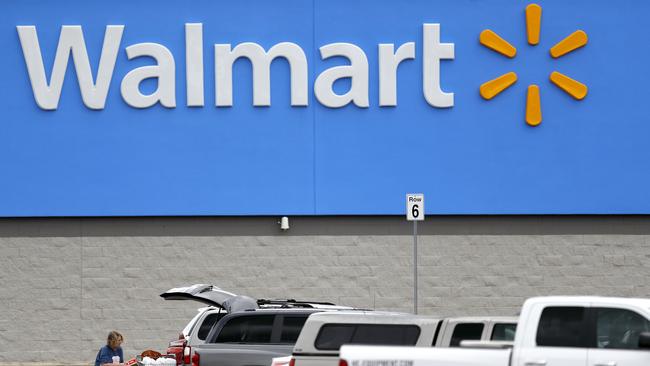
AP



To join the conversation, please log in. Don't have an account? Register
Join the conversation, you are commenting as Logout